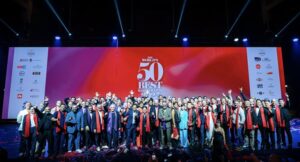The National Food Agency (Bapanas) and state-owned food enterprise ID Food are joining forces to bolster Indonesia’s food security by importing 20,000 tons of garlic from China. This collaborative effort was announced following a recent Limited Coordination Meeting (Rakortas) spearheaded by Bapanas.
“During the final Rakortas before Lebaran, we decided to collaborate with ID Food for this initiative,” explained Bapanas Head Arief Prasetyo Adi. “This initial import project aims to establish a 20,000-ton garlic stockpile as part of the government’s Central Buffer Stock (CBP),” he stated at a press conference held in Jakarta on Thursday (18/4/2024).
To ensure a seamless import process, Arief underscored the importance of cooperation between Bapanas and relevant ministries. Collaboration with the Ministry of Agriculture to expedite the issuance of Garlic Import Recommendation Permits (RIPH) and with the Ministry of Trade to facilitate the swift granting of Import Permits (PI) is critical.
Funding for this import initiative comes from a Rp 28.7 trillion budget allocated by the Ministry of Finance. This budget was secured through a partnership with Himbara banks, offering favorable interest rates for state-owned food enterprises. So far, Perum Bulog is the sole entity to have accessed these funds.
“Currently, Bulog holds Rp 13 trillion of these low-interest funds, and RNI is in the process of securing its share,” explained Arief. “Once RNI receives access to the funds, they can directly bid with Chinese suppliers for the 20,000 tons of garlic, valued at Rp 28 billion. This import will contribute to replenishing the government’s food security reserves,” he added. By establishing a garlic reserve, Bapanas and ID Food aim to empower Bulog to effectively regulate garlic prices and prevent potential price fluctuations in the market. This action complements assurances from Trade Minister Zulkifli Hasan regarding the ongoing, uninterrupted process of garlic imports. The Ministry has already issued import permits for a total of 300,000 tons of garlic to meet domestic requirements.
Moreover, the academy’s presence in Bali holds promise for the local economy, driving job creation and economic growth in the region. By attracting top talent and fostering innovation, it positions Bali as a leading hub for technological advancement and entrepreneurship. In essence, the Apple Developer Academy Bali represents more than just a training center—it embodies a vision of empowerment, collaboration, and progress. As students embark on their journey, they carry with them the potential to shape the future of technology and make a meaningful impact on the world.








